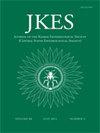Molecular Characterization, Expression and Binding Specificity Analysis of the Odorant-Binding Proteins of Scleroderma sichuanensis Xiao (Hymenoptera: Bethylidae)
IF 0.3
4区 农林科学
Q4 ENTOMOLOGY
引用次数: 2
Abstract
Abstract: Odorant-binding proteins (OBPs) play an important role in the sense of smell in parasitoid wasps, especially for locating hosts and mates. Clarifying the role of OBPs in information exchanges between parasitoid wasps and their environment is beneficial for understanding the sense of smell in parasitoid wasps. To this end, we cloned the OBPs, SsicOBP1 and SsicOBP2 (GenBank accession numbers: AKP80533.1 and AKP80534.1), of Scleroderma sichuanensis Xiao and then proceeded to conduct prokaryotic expression and qPCR analysis, and determine the binding capacity of SsicOBP1 and SsicOBP2 with 18 types of volatiles from Pinus massoniana Lambert using competitive binding (with 1-NPN as fluorescent probes). We found that SsicOBP1 and SsicOBP2 are expressed at high levels in the antennae of Scleroderma sichuanensis Xiao. Of the 18 types of P. massoniana volatiles, SsicOBP1 could bind effectively with ocimene (binding constant of 12.82 µM) and β-pinene (binding constant of 15.57 µM). SsicOBP2 could bind effectively with α-pinene (with a binding constant of 13.52 µM), ocimene (binding constant of 14.38 µM) and β-pinene (binding constant of 14.51 µM). From this, we could infer that SsicOBP1 and SsicOBP2 are general odorant-binding proteins, which play an important role in sensing plant volatiles.四川硬皮病气味结合蛋白的分子特征、表达及结合特异性分析(膜翅目:白茧蜂科)
摘要/ Abstract摘要:气味结合蛋白(OBPs)在寄生蜂的嗅觉功能中起着重要的作用,特别是在定位寄主和配偶方面。阐明OBPs在寄生蜂与环境信息交换中的作用,有助于理解寄生蜂的嗅觉。为此,我们克隆了四川硬皮病萧的OBPs, SsicOBP1和SsicOBP2 (GenBank登录号:AKP80533.1和AKP80534.1),进行原核表达和qPCR分析,并采用竞争结合(以1-NPN为荧光探针)测定了SsicOBP1和SsicOBP2与马尾松18种挥发物的结合能力。我们发现SsicOBP1和SsicOBP2在四川硬皮病小虫的触角中高水平表达。在18种马尾草挥发物中,SsicOBP1能与辛烯(结合常数为12.82µM)和β-蒎烯(结合常数为15.57µM)有效结合。sicobp2能与α-蒎烯(结合常数为13.52µM)、辛烯(结合常数为14.38µM)和β-蒎烯(结合常数为14.51µM)有效结合。由此我们可以推断,SsicOBP1和SsicOBP2是一般的气味结合蛋白,在植物挥发物的感知中发挥重要作用。
本文章由计算机程序翻译,如有差异,请以英文原文为准。
求助全文
约1分钟内获得全文
求助全文
来源期刊
CiteScore
1.60
自引率
0.00%
发文量
12
审稿时长
>12 weeks
期刊介绍:
The Journal of the Kansas Entomological Society is a publication of the Kansas (Central States) Entomological Society, publishes research on all aspects of the sciences of entomology, and has world-wide authorship and readership.

 求助内容:
求助内容: 应助结果提醒方式:
应助结果提醒方式:


